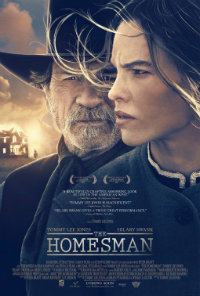Jumping Claims: Jones’ Attempt at Revisionist Western Withers Under its Own Intentions
 Try as it might, The Homesman, Tommy Lee Jones’ first directorial effort since his 2005 film The Three Burials of Melquiades Estrada, fails to deliver an accurate rendering of the miserable plight of women in the Old West. While some are sure to embrace the superficial revisionist attempt at providing us with a feminist subtext, Jones actually manages to accomplish the opposite with a film that only highlights a male perspective’s well-meaning but misguided interpretation of a story about women. As it completely sells out on its main female protagonist, it’s clear that the project is merely a vanity piece where a multitude of characters are only utilized to compliment his presence, as well as a moment of convenient (and false pathos).
Try as it might, The Homesman, Tommy Lee Jones’ first directorial effort since his 2005 film The Three Burials of Melquiades Estrada, fails to deliver an accurate rendering of the miserable plight of women in the Old West. While some are sure to embrace the superficial revisionist attempt at providing us with a feminist subtext, Jones actually manages to accomplish the opposite with a film that only highlights a male perspective’s well-meaning but misguided interpretation of a story about women. As it completely sells out on its main female protagonist, it’s clear that the project is merely a vanity piece where a multitude of characters are only utilized to compliment his presence, as well as a moment of convenient (and false pathos).
A thirty one year old spinster, Mary Bee Cuddy (Hilary Swank) is a rare example of an independent woman in the 1850s Midwest. She’s got financial stability and is a devout follower of the Christian faith. And yet, she seems to want nothing more than to find a husband. But life on the plains has proved less fruitful for some of the other females in the surrounding area, and Mary Bee ends up being tasked with transporting three insane women (Sonja Richter, Grace Gummer, Miranda Otto) back East to Iowa. As she prepares for the strenuous journey, she comes across a vagabond claim jumper, George Briggs (Tommy Lee Jones), sitting on a horse about to be hanged from a tree. In order for helping him out, she secures a promise from Briggs to help her transport the three women in a journey that will take several weeks.
Jones’ attempt at engineering a strong-willed pioneer woman with Swank’s Mary Bee Cuddy fails miserably, even from the introduction of the character. Filled in eyebrows doth not a pioneer woman make, and Swank’s considerably pearly whites are the first of many glaring details (like all the very clean, pressed costumes) that point out the glaring lack of attention to detail in the set design and look of the film.
Much like Kim Darby’s grating but headstrong woman in the original True Grit, Swank is saddled with playing an independent and highly intelligent woman that’s supremely repellant to men. Yet, Mary Bee Cuddy is shown to be desperate for nothing more than landing a husband, throwing herself at the two that happen to pay her any attention at all in our presence. She likes playing the piano, too, but it hardly seems to excite her like the prospect of marriage. Doubly irritating is the narrative’s insistence at citing Swank as “plain as tin bucket,” which the striking actress is clearly not. Likewise, her Christian beliefs, repeatedly referenced, are contradicted by a midpoint turn of events that confirm Mary Bee Cuddy to be nothing more than the vapor of an idea that floats Jones’ George Briggs into skating through the final frames a changed man.
It appears that the three crazy women in their company are equally undercooked, with Jones and screenwriters Kieran Fitzgerald and Wesley Oliver (adapting from a 1988 novel by Glendon Swarthout) failing to afford the women any dialogue, as if they were as leery of them as the people tasked with transporting them. Jones’ flashes back to snippets of their scenarios so we can deduce how they all became mentally unhinged exemplifies the types of perverse sexual scenarios that the likes of John Ford could only ever hint at. Yet, making them all impossibly and conveniently mute reduces them to plot gimmicks.
The presence of yet another of Meryl Streep’s daughters, Grace Gummer, as she clings to a blond rag doll, is irritating, but wasting the likes of Miranda Otto and Sonja Richter is the real missed opportunity. Streep herself gets an underwhelming cameo in the final throes, while Hailee Stanfield appears for a burdensome moment of forced catharsis (though her casting is interesting to note since the actress superseded Darby in the True Grit remake).
Geared toward a mainstream mentality of what the Western as a dramatic genre used to perhaps invoke, the end result of The Homesman is an ostentatious show for the multitalented Jones. While it may afford us with a rare perspective of women’s experiences in such a time and place, the film’s narrative manages to appear misogynistic even as it appears to be developing an argument for agency.
Reviewed on May 17 at the 2014 Cannes Film Festival – Main Competition – 122 Minutes
★★/☆☆☆☆☆


